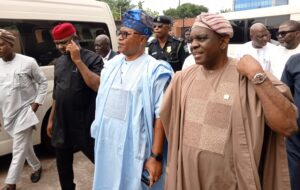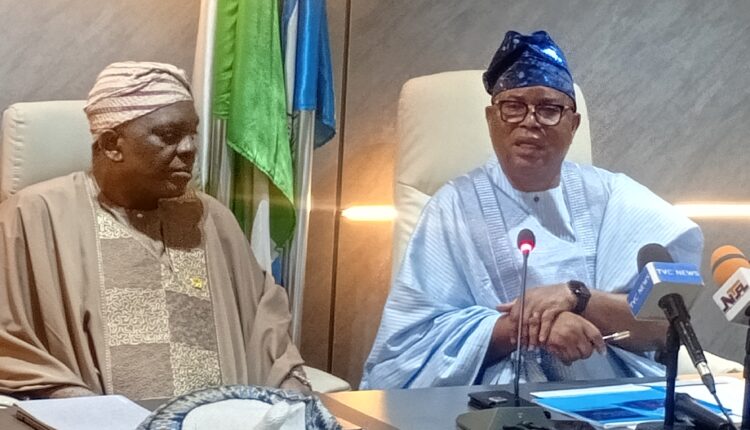The Senate Committee on Marine Transport has reiterated its commitment to strengthening Nigeria’s maritime sector, following an oversight visit to the Nigerian Shippers’ Council (NSC) headquarters in Apapa, Lagos, on Thursday.
The delegation, led by Committee Chairman Senator Wasiu Eshilokun Sanni, inspected ongoing and completed infrastructure projects at the NSC, including the newly renovated boardroom at the Shippers’ Towers, which was formally commissioned by the senator.

Council’s Role in Maritime Regulation
Welcoming the lawmakers, the Executive Secretary and Chief Executive Officer of the NSC, Dr. Akutah Pius Ukeyima, commended the cordial working relationship between the Council and the National Assembly.
He noted that the Council has consistently played a key role in regulating tariffs, coordinating pricing mechanisms, and enhancing transparency in Nigeria’s maritime industry. According to him, these efforts have contributed to reducing logistics costs and promoting trade facilitation across the country’s ports.

Dr. Akutah further showcased several infrastructure upgrades at the NSC headquarters designed to boost operational efficiency and safety. These include sewage system improvements, realignment of service cables, roofing of the generator platform, as well as plans for an in-house medical laboratory to complement the existing clinic facilities.
Push for Legal and Financial Stability
A major highlight of the visit was deliberations on the financial framework underpinning the Council’s regulatory functions. Dr. Akutah explained that while the NSC currently derives funding from the 7 percent Port Development Levy (PDL), the arrangement lacks firm legislative backing, thereby undermining financial stability.

He stressed the urgent need for the passage of the Nigerian Port Economic Regulation Act (NIPERA) Bill, which he said would provide a solid legal foundation for the Council’s mandate and improve investor confidence in the maritime industry.
Equally, he highlighted the importance of the 1 percent Freight Stabilization Fee, a statutory charge he described not as a tax but as a service charge essential for sustaining regulatory oversight functions such as tariff monitoring, dispute resolution, and cargo protection.
Dr. Akutah assured the Committee that the fee is consistent with the Nigerian Tax Administration Act 2025 and in line with World Trade Organization (WTO) Trade Facilitation Agreement principles.

According to him, “2 percent of the Port Development Levy currently funds the Council, while the National Assembly in 2025 approved the 1 percent freight fee, thereby providing a stronger financial framework for our operations.”
He also lauded the unwavering support of the Minister of Marine and Blue Economy, Adegboyega Oyetola, CON, alongside the Senate Committee, for their roles in championing reforms that would secure the Council’s financial independence.

Call for ICTN Passage
Adding to the discourse, Rotimi Anifowoshe, Director of Strategic Planning and Research at the NSC, urged the Senate to support the passage of the International Cargo Tracking Note (ICTN). He argued that ICTN remains a critical tool for ensuring cargo safety, trade transparency, and enhanced port efficiency.

Senate’s Commitment to Maritime Growth
In his remarks, Senator Eshilokun praised the Council for its transparency and its central role in unlocking the potentials of Nigeria’s marine and blue economy.
“The Shippers’ Council plays a pivotal role in the maritime industry. As lawmakers, we are determined to ensure that the Council excels in its mandate. Together with stakeholders, we will continue to work closely to drive industry growth,” he assured.
Other members of the Committee echoed similar sentiments, pledging continued legislative support to strengthen Nigeria’s maritime regulatory framework.
The oversight visit, according to observers, reflects the Senate’s broader commitment to fostering a competitive, transparent, and well-regulated maritime sector, capable of driving Nigeria’s trade expansion under the African Continental Free Trade Agreement (AfCFTA).





